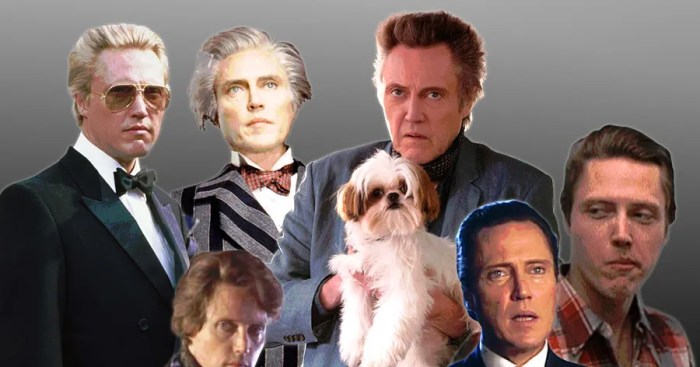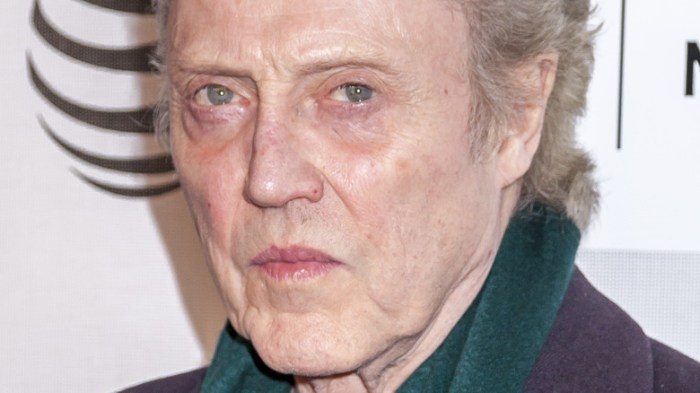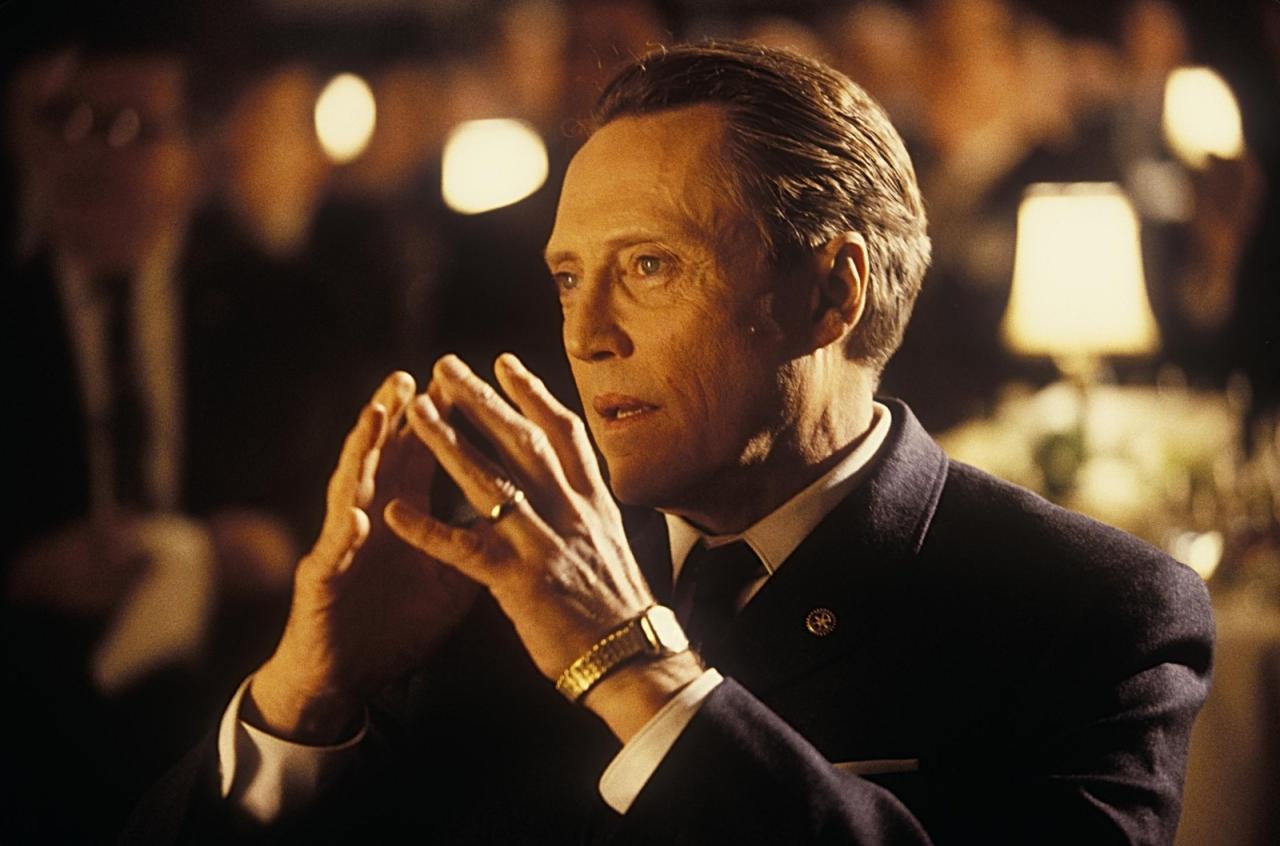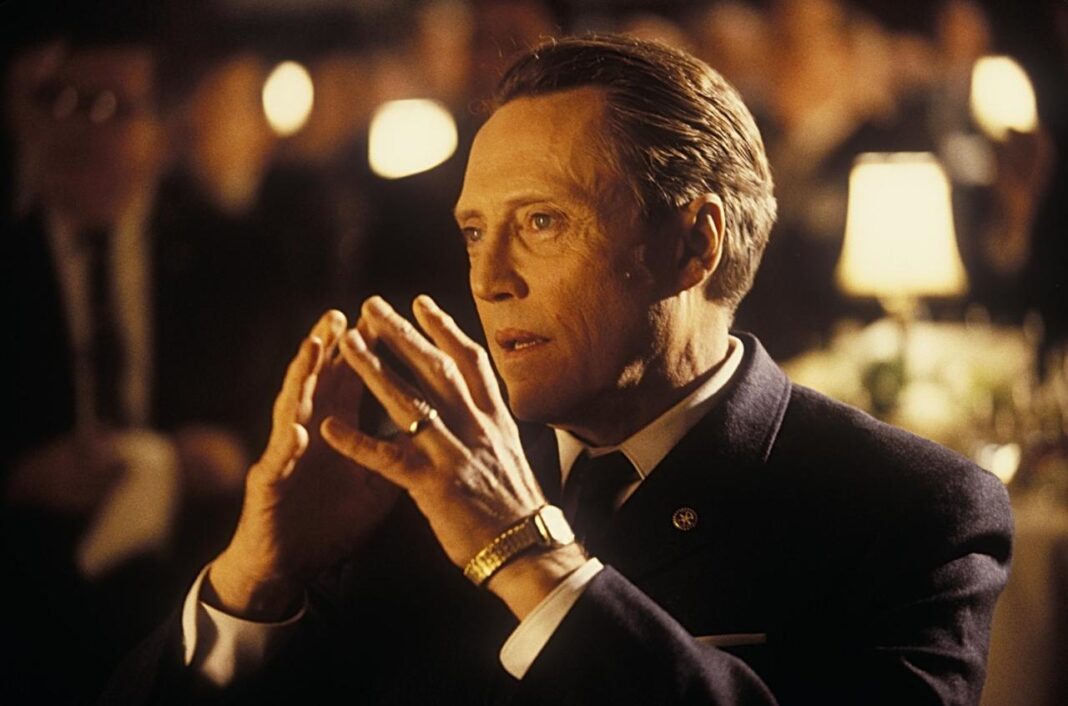Christopher Walken, an enigmatic and captivating actor, has graced the silver screen for decades, leaving an indelible mark on the world of cinema. With his signature mannerisms, haunting voice, and captivating physicality, Walken has embodied a diverse range of characters, from quirky villains to enigmatic heroes, cementing his status as a Hollywood icon.
Throughout his illustrious career, Walken has collaborated with renowned directors such as Martin Scorsese, Steven Spielberg, and Quentin Tarantino, showcasing his versatility and adaptability. His performances have garnered critical acclaim and numerous awards, including an Academy Award and a BAFTA Award, solidifying his place among the greatest actors of our time.
Christopher Walken’s Iconic Roles in Film

Christopher Walken, known for his eccentric and captivating performances, has graced the silver screen with a multitude of unforgettable roles. From the villainous Max Zorin in the James Bond franchise to the enigmatic Agent Smith in the Matrix trilogy, Walken’s versatility and intensity have left an enduring mark on cinema history.
Notable Film Roles
- The Deer Hunter (1978): Walken’s breakout role as Nikanor “Nick” Chevotarevich, a steelworker who descends into despair during the Vietnam War, earned him an Academy Award for Best Supporting Actor.
- Annie Hall (1977): Walken’s portrayal of Duane Hall, the neurotic brother of the titular character, showcased his comedic timing and earned him an Academy Award nomination.
- A View to a Kill (1985): Walken played Max Zorin, a ruthless businessman who plots to destroy Silicon Valley, in this James Bond film.
- The Dead Zone (1983): Walken starred as Johnny Smith, a man who gains the ability to see into the future after a near-fatal accident.
- Batman Returns (1992): Walken portrayed the deformed and unhinged villain Max Shreck, who seeks to control Gotham City.
- Pulp Fiction (1994): Walken’s memorable cameo as Captain Koons, a watch-obsessed Army officer, became an instant cult classic.
- Catch Me If You Can (2002): Walken played Frank Abagnale Sr., the father of the real-life con artist Frank Abagnale Jr.
- The Matrix (1999): Walken portrayed Agent Smith, the primary antagonist of the film, an artificial intelligence that seeks to control the human world.
Walken’s Unique Acting Style
Christopher Walken’s distinctive acting style has made him an iconic figure in the film industry. His signature mannerisms, vocal delivery, and physicality have captivated audiences for decades.
Walken’s acting is characterized by his deliberate and rhythmic speech, often punctuated by long pauses. He employs a wide range of vocal inflections, from a deep, resonant drawl to a high-pitched, almost childlike tone.
Distinctive Mannerisms
- Wide-Eyed Stare: Walken’s piercing blue eyes often stare directly into the camera, creating an intense and unsettling effect.
- Asymmetrical Movements: His body language is often asymmetrical, with one arm or leg moving differently from the other, adding an air of unpredictability.
- Hand Gestures: Walken’s hands are expressive, often used to emphasize his words or convey subtle emotions.
Walken’s Collaborations with Renowned Directors
Throughout his illustrious career, Christopher Walken has collaborated with some of the most celebrated directors in cinema history. These collaborations have had a profound impact on his career and acting style, helping to shape his unique and unforgettable performances.
Collaboration with Quentin Tarantino
One of Walken’s most notable collaborations was with director Quentin Tarantino in the iconic film “Pulp Fiction” (1994). Tarantino’s unconventional storytelling and quirky dialogue allowed Walken to showcase his comedic timing and eccentric delivery, resulting in one of his most memorable performances as Captain Koons.
This collaboration not only cemented Walken’s status as a character actor but also introduced him to a new generation of filmgoers.
Collaboration with Tim Burton
Walken has also collaborated with visionary director Tim Burton on several occasions. In “Batman Returns” (1992), he portrayed the enigmatic Max Shreck, a corrupt businessman who manipulates both Batman and the Penguin. Burton’s gothic aesthetic and Walken’s idiosyncratic acting style created a truly unforgettable character.
Their subsequent collaborations, such as “Sleepy Hollow” (1999) and “Big Fish” (2003), further showcased Walken’s versatility and ability to bring depth to even the most eccentric characters.
Collaboration with Martin Scorsese
Walken has had a long-standing relationship with director Martin Scorsese, appearing in several of his films. In “The Deer Hunter” (1978), Walken delivered a haunting performance as Nikanor “Nick” Chevotarevich, a Russian roulette-playing soldier. His portrayal earned him an Academy Award for Best Supporting Actor.
Walken also collaborated with Scorsese in “King of Comedy” (1982) and “True Romance” (1993), further solidifying his reputation as one of the most talented character actors of his generation.
Impact of Collaborations
Walken’s collaborations with renowned directors have not only elevated his performances but have also expanded his range as an actor. By working with these visionary filmmakers, Walken has been able to explore a wide variety of characters and styles, showcasing his versatility and adaptability.
These collaborations have also helped to cement his status as one of the most respected and acclaimed actors in Hollywood.
Walken’s Impact on American Cinema
Christopher Walken has left an indelible mark on the American film industry. His eccentric mannerisms, commanding presence, and versatile acting skills have influenced generations of actors and filmmakers.Walken’s unique style has transcended genres, from gritty crime dramas to whimsical comedies.
He has brought depth and nuance to iconic characters, such as the enigmatic mobster in “Pulp Fiction” and the eccentric inventor in “The Dead Zone.” His performances have been widely acclaimed, earning him an Academy Award, a BAFTA Award, and numerous other accolades.
Influence on Younger Actors
Walken’s influence extends beyond his own performances. He has become a mentor to younger actors, sharing his insights on the craft and encouraging them to embrace their individuality. His unconventional approach has inspired a new generation of performers to break away from traditional acting styles and explore their own unique voices.
Walken’s Cultural Impact
Christopher Walken’s idiosyncratic style and memorable performances have left an indelible mark on popular culture. His iconic quotes, eccentric dance moves, and enigmatic persona have made him a cultural icon, referenced in countless parodies, tributes, and memes.
Walken’s unique delivery and enigmatic presence have spawned a cult following, with fans imitating his distinctive cadence, gestures, and facial expressions. His signature dance moves, such as the “Walken Shuffle,” have become synonymous with his persona and have been incorporated into various forms of entertainment.
Iconic Quotes
Walken’s quotable lines have become ingrained in popular culture. Phrases like “I got a fever, and the only prescription is more cowbell” (from “Saturday Night Live”) and “The best thing about Switzerland is the flag” (from “True Romance”) have become widely recognized and parodied.
Memorable Performances
Walken’s diverse filmography boasts a range of iconic performances. His portrayal of the menacing gangster in “The Deer Hunter” (1978) earned him an Academy Award for Best Supporting Actor. Other memorable roles include the eccentric dance instructor in “The Comfort of Strangers” (1990), the ruthless Kingpin in “Pulp Fiction” (1994), and the eccentric Captain Koons in “Catch Me If You Can” (2002).
Cultural Icon
Walken’s unique style and memorable performances have cemented his status as a cultural icon. He has been referenced in countless works of popular culture, including films, television shows, and music. His image has been parodied and imitated by comedians, actors, and even musicians.
Walken’s Award-Winning Performances
Christopher Walken has been recognized for his exceptional acting skills with numerous prestigious awards throughout his career.
His most notable accolade is the Academy Award for Best Supporting Actor, which he won for his role as Nick Chevotarevich in the 1978 Vietnam War drama The Deer Hunter . This award solidified his status as a highly respected and talented actor.
BAFTA Awards
In addition to his Oscar, Walken has received two British Academy Film Awards (BAFTAs): one for Best Actor in a Supporting Role for The Deer Hunter and another for Best Actor in a Leading Role for Pennies from Heaven (1981).
Golden Globe Awards
Walken has also been honored with two Golden Globe Awards for Best Supporting Actor: one for The Deer Hunter and the other for his role as Roy Fox in the 1996 romantic comedy The Funeral .
These awards have not only celebrated Walken’s exceptional performances but have also significantly contributed to his career success and reputation as one of the most versatile and captivating actors of his generation.
Walken’s Versatility as an Actor
Christopher Walken’s exceptional acting range has allowed him to portray a vast spectrum of characters, from eccentric villains to enigmatic heroes. His versatility shines through in his ability to embody diverse roles and genres, from psychological thrillers to historical dramas.
Characters with Peculiar Mannerisms
Walken has a knack for bringing eccentric characters to life, often with distinctive mannerisms and speech patterns. His performance as the mysterious and menacing Mr. Smith in “Pulp Fiction” showcased his ability to create unforgettable characters with subtle yet impactful quirks.
Villains with a Dark Edge
Walken has portrayed some of cinema’s most iconic villains, including the ruthless Russian mobster Viktor Rostavili in “The Deer Hunter” and the deranged serial killer in “The Prophecy.” His ability to convey both the malevolence and vulnerability of these characters has left a lasting impression on audiences.
Historical Figures with Depth
Walken has also excelled in historical roles, bringing depth and nuance to complex figures. His portrayal of Captain Hook in “Peter Pan” and General George Washington in “The Crossing” demonstrated his ability to inhabit historical characters with authenticity and charisma.
Walken’s Legacy in Film and Television

Christopher Walken has left an indelible mark on the entertainment industry, captivating audiences with his distinctive style and enigmatic presence. His unique blend of eccentricity and intensity has influenced generations of actors and filmmakers.Walken’s performances have showcased a wide range of characters, from eccentric criminals to vulnerable outcasts.
His ability to inhabit these diverse roles has cemented his status as one of the most versatile and compelling actors of his time.
Walken’s influence on future generations of actors is undeniable. His unconventional approach to acting has inspired many young performers to embrace their own individuality and push creative boundaries. His unique mannerisms and speech patterns have become iconic, inspiring countless parodies and imitations.
Walken has also collaborated with some of the most renowned directors in film history, including Martin Scorsese, Quentin Tarantino, and Ridley Scott. These collaborations have resulted in some of Walken’s most memorable and acclaimed performances, showcasing his ability to adapt to different directorial styles and bring complex characters to life.Walken’s
enduring legacy in film and television is a testament to his extraordinary talent and the impact he has had on the entertainment industry. He continues to be an inspiration to actors and filmmakers alike, proving that individuality and unconventionalism can lead to enduring success.
Walken’s Memorable Characters in Theatre
Christopher Walken’s acting prowess extends beyond the silver screen to the stage, where he has captivated audiences with his enigmatic and memorable performances. Throughout his illustrious career, Walken has graced the stages of renowned theatres, showcasing his versatility and leaving an indelible mark on the world of theatre.
One of Walken’s most iconic stage roles was in the 1976 production of “Hamlet” at the Lincoln Center. His portrayal of the tortured prince was hailed by critics as both chilling and mesmerizing, earning him a Tony Award nomination for Best Actor in a Play.
Walken’s Hamlet was a complex and multifaceted character, torn between duty, desire, and the weight of his own conscience.
Broadway Debut
Walken made his Broadway debut in 1972 in the play “The Rose Tattoo” by Tennessee Williams. His performance as the emotionally scarred Serafina Delle Rose earned him critical acclaim and established him as a rising star in the theatre world.
Other Notable Stage Performances
In addition to “Hamlet,” Walken has starred in a wide range of other notable stage productions, including:
- “The Seagull” (1983)
- “Macbeth” (1984)
- “A Midsummer Night’s Dream” (1988)
- “Waiting for Godot” (1993)
- “The Tempest” (2004)
Through his captivating stage performances, Christopher Walken has cemented his status as a true icon of both film and theatre. His unique acting style, mesmerizing presence, and ability to bring complex characters to life have left an enduring legacy on the world of entertainment.
Walken’s Personal Life and Influences

Christopher Walken was born Ronald Walken on March 31, 1943, in Astoria, Queens, New York City. His father, Paul Walken, was a baker of German descent, and his mother, Rosalie Russell Walken, was a Scottish immigrant who worked as a homemaker.
Walken has two older brothers, Kenneth and Glenn.Walken’s parents divorced when he was three years old, and he was raised by his mother and stepfather, Roy Dotrice, a British actor. Walken attended Hofstra University for two years before dropping out to pursue an acting career.
He made his Broadway debut in 1964 in the play “The Lion in Winter.”Walken has been married to Georgianne Thon since 1969. They have one daughter, Marie-Sophie Walken. Walken is known for his distinctive voice, mannerisms, and acting style. He has often played eccentric or offbeat characters, and he is known for his intense and often unpredictable performances.
Significant Influences
Walken has cited several influences on his acting career, including Marlon Brando, James Dean, and Montgomery Clift. He has also said that he was influenced by the work of Bertolt Brecht and Samuel Beckett. Walken’s acting style is often characterized by its physicality and its use of repetition and improvisation.
He is also known for his ability to create memorable characters with just a few gestures or words.
Final Summary
Christopher Walken’s legacy in film and television is undeniable. His unique acting style and memorable performances have left an enduring impression on audiences worldwide. From his chilling portrayal of the Russian roulette-playing deer hunter to his eccentric turn as the tap-dancing villain in “Pulp Fiction,” Walken has consistently defied expectations and captivated viewers with his enigmatic presence.
As a true cinematic chameleon, he has left an indelible mark on the entertainment industry, inspiring generations of actors and filmmakers alike.
Answers to Common Questions
What is Christopher Walken’s most famous role?
Walken has played numerous iconic roles, but his portrayal of Nick Chevotarevich in “The Deer Hunter” (1978) is widely considered his most memorable performance.
What is Christopher Walken’s signature acting style?
Walken is known for his distinctive mannerisms, including his slow, deliberate speech, piercing gaze, and quirky physicality.
How many Academy Awards has Christopher Walken won?
Walken has won one Academy Award for Best Supporting Actor for his performance in “The Deer Hunter” (1978).
What is Christopher Walken’s net worth?
As of 2023, Christopher Walken’s net worth is estimated to be around $50 million.
What is Christopher Walken’s age?
Christopher Walken was born on March 31, 1943, making him 80 years old as of 2023.


